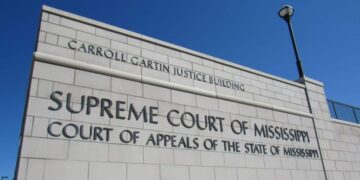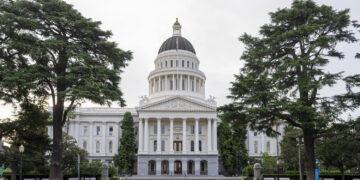April 24, 2025 Story by: Editor
A federal judge in Washington, D.C., has paused a key section of President Trump’s executive order that makes sweeping changes to voting and elections.
Critics of Trump’s March 25 executive order say it could disenfranchise millions of would-be voters, and exceeds presidential authority.
The executive order instructs the independent Election Assistance Commission (EAC) to change the national mail voter registration form to require that applicants show a document proving U.S. citizenship before they can be registered to vote.
But a court order issued Thursday puts that instruction on hold.
“Our Constitution entrusts Congress and the States—not the President—with the authority to regulate federal elections,” wrote Judge Colleen Kollar-Kotelly in a 120-page opinion, while noting that Congress is currently debating legislation — the SAVE Act — that would require showing proof of citizenship to register to vote in federal elections.
Earlier this month, the GOP-led House of Representatives, mostly along party lines, passed the SAVE Act. The bill faces an uphill battle in the Senate, where Democrats have vowed to block it through a filibuster.
Trump’s executive order essentially seeks to implement much of the SAVE Act by executive decree — a move the judge rejected.
“[N]o statutory delegation of authority to the Executive Branch permits the President to short-circuit Congress’s deliberative process by executive order,” wrote Kollar-Kotelly, who was appointed to the federal district court in Washington, D.C., by former President Bill Clinton.
Kollar-Kotelly’s order is, for now, a legal victory for voter registration groups and Democrats that are challenging Trump’s far-reaching executive order in three lawsuits that have been consolidated.
“The court’s decision today provides crucial protections for eligible voters, and the organizations that help them register to vote, while the fight continues against this illegal executive order,” reads a joint statement from lawyers from the American Civil Liberties Union, Asian Americans Advancing Justice, Brennan Center for Justice, the Legal Defense Fund and Latino Justice PRLDEF, which are representing several voter registration groups challenging the order. “Millions of U.S. citizens lack easy access to a passport or other documents proving citizenship, and that shouldn’t interfere with their ability to register to vote.”
In a statement, White House spokesperson Harrison Fields said, “President Trump will keep fighting for election integrity, despite Democrat objections that reveal their disdain for commonsense safeguards like verifying citizenship. Free and fair elections are the bedrock of our Constitutional Republic, and we’re confident in securing an ultimate victory in the courtroom.”
The judge’s decision also pauses a second provision of Trump’s executive order that requires certain government agencies to verify U.S. citizenship before giving voter registration forms to enrollees of public assistance programs. Kollar-Kotelly said this provision is in conflict with the 1993 National Voter Registration Act, which mandates those agencies give out voter registration forms, unless an applicant opts out.
Other portions of the executive order are still being litigated, including a provision that withholds federal funds from states that count mail and absentee ballots that are postmarked by Election Day but are received by election officials afterwards.
Though Democratic plaintiffs had asked to pause that and other sections of the executive order, Kollar-Kotelly said those requests were premature or should be brought by states.
Another legal challenge to Trump’s order brought by 19 Democratic state attorneys general in federal court in Massachusetts is proceeding separately, though the government has asked for that case to be moved to Washington, D.C., to be consolidated with the one before Kollar-Kotelly. Washington and Oregon, which rely heavily on mail voting, have filed a separate lawsuit.
The plaintiffs in the D.C. lawsuit argue that the president cannot direct the EAC what to do. The commission, which is an independent entity, has four members, and can only have two members from the same political party. It cannot take action without approval from three members, to ensure a bipartisan approach.
Following Trump’s executive order, the commission’s executive director sent an April 11 letter to state election officials soliciting feedback about “how states would propose to implement” the provision in question, “if required.” The EAC was set to discuss the order at its meeting Thursday.
Trump’s order says it’s needed to enforce election protections, and the government argued in court that plaintiffs did not have standing to challenge the order.
The various plaintiffs challenging Trump’s executive order argue requiring documentary proof of citizenship to register to vote would create barriers for millions of eligible voters. Trump’s executive order lists only a limited number of documents that can be used to prove citizenship, and it remains unclear if a birth certificate would be accepted. Passports are the most common option named in the order, but only about half of American citizens have one.
The current version of the national voter registration form asks applicants to attest, under penalty of perjury, that they are U.S. citizens and eligible to vote. Noncitizens who attempt to vote illegally face deportation and jail time.
While noncitizens do sometimes wind up on voter rolls, state audits have found instances of noncitizens voting to be exceedingly rare.
Trump, however, pushed a baseless narrative during the 2024 election that large numbers of noncitizens were poised to vote and swing the election for Democrats. No evidence of such a plot has surfaced, but Trump and Republicans have continued to cite the narrative to justify more restrictive voting requirements.
As the March 25 executive order continues to be litigated, state and local election officials say they are waiting for clear answers before beginning to implement changes.
“My job is to wait for guidance and instructions on how to go about implementing any regulations that come down,” said Tim Tsujii, who oversees elections in North Carolina’s Forsyth County. “I’m in a holding pattern right now.”
Source: NPR

















